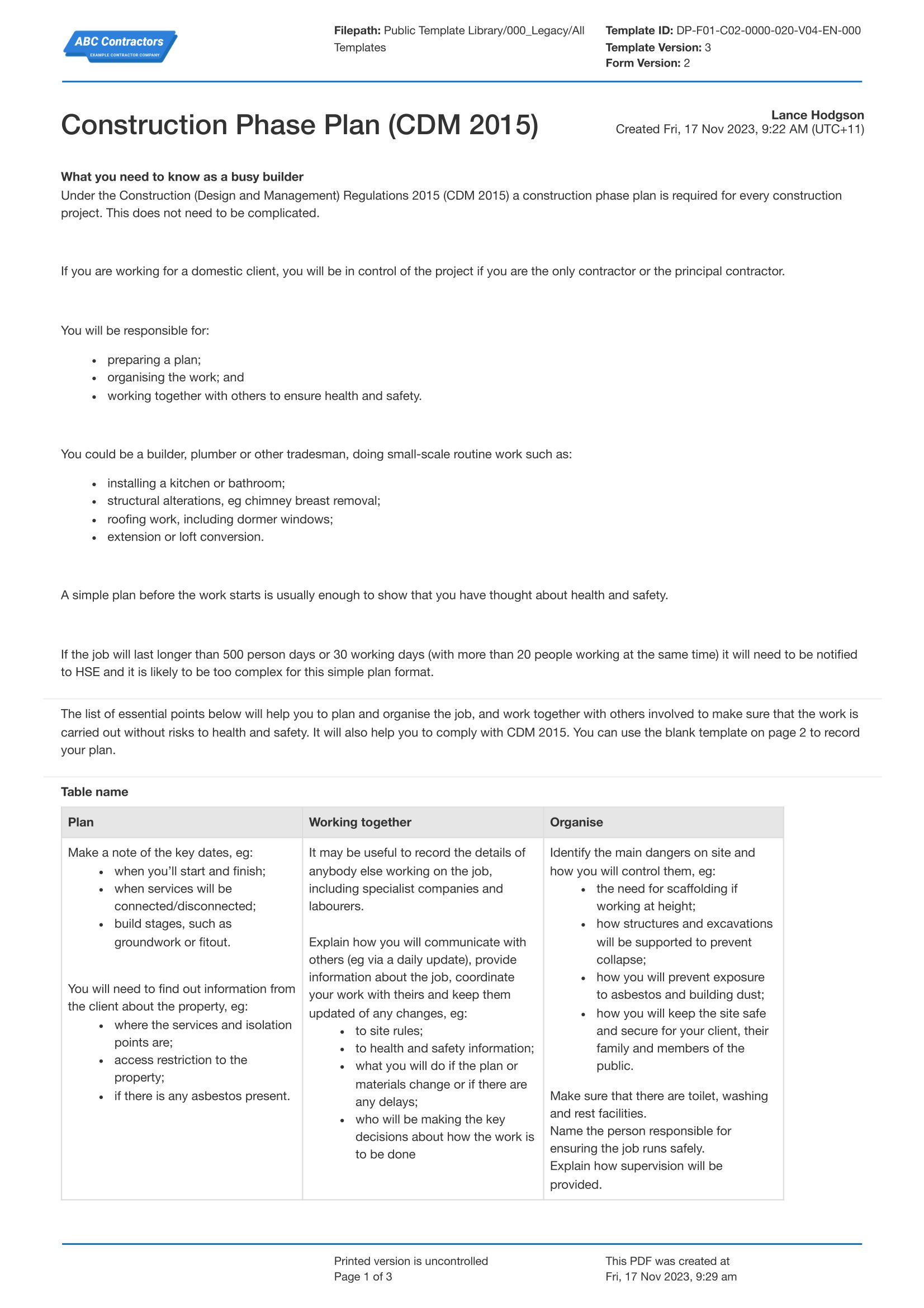Master your next build with our expert-backed construction phase plan example that transforms complex requirements into clear, actionable steps.
In today’s complex construction landscape, having a well-structured construction phase plan isn’t just good practice – it’s a legal requirement under UK regulations. Whether you’re managing a small renovation or overseeing a major development, understanding how to create and implement an effective construction phase plan is crucial for project success and regulatory compliance.
Understanding Construction Phase Plans: The Basics
A construction phase plan (CPP) is a legally required document under the Construction (Design and Management) Regulations 2015 (CDM 2015) that outlines how health and safety will be managed during a construction project. Recent statistics show that proper implementation of construction phase plans has contributed to a 25% reduction in workplace accidents across UK construction sites since 2020. The plan serves as a comprehensive roadmap for managing health and safety risks throughout the construction phase, ensuring all stakeholders understand their responsibilities and the measures in place to protect workers and the public.
Essential Components of Your Construction Phase Plan
Project Information and Team Structure
Every effective construction phase plan begins with clear project details and a well-defined team structure. This section must include:
- Project name, location, and scope of works
- Key project dates and milestones
- Client details and principal contractor information
- Details of the principal designer and other key stakeholders
- Chain of responsibility for health and safety management
- Project-specific roles and responsibilities
Site Setup and Logistics
The site setup section is crucial for establishing safe and efficient operations. This should detail:
- Site layout plans showing welfare facilities, storage areas, and access routes
- Traffic management arrangements
- Location of temporary services (water, electricity, etc.)
- Security measures and site boundaries
- Waste management procedures
Risk Assessment and Control Measures
A thorough risk assessment forms the backbone of any construction phase plan. Studies indicate that comprehensive risk assessments can prevent up to 70% of site accidents. Your risk assessment should identify potential hazards and specify control measures for:
- Work at height
- Manual handling operations
- Plant and machinery use
- Hazardous substances
- Environmental risks
Implementing Your Construction Phase Plan
Work Methods and Safety Procedures
This section should outline specific procedures for high-risk activities, including detailed method statements for:
Working at height – including scaffold requirements, fall protection systems, and inspection protocols. Excavation work – detailing ground conditions, support systems, and safe access arrangements. Lifting operations – specifying crane positions, load paths, and banksman arrangements. Your procedures should align with the latest HSE guidelines and industry best practices.
Plant and Equipment Management
Effective plant and equipment management is essential for site safety. Include:
- Equipment inspection schedules
- Maintenance procedures
- Operator competency requirements
- Safe storage arrangements
- Emergency shutdown procedures
Emergency Procedures and Contact Information
Clear emergency procedures can mean the difference between life and death. Your plan should include:
- Fire evacuation procedures
- First aid arrangements
- Emergency contact numbers
- Accident reporting protocols
- Location of emergency equipment
Monitoring and Reviewing Your Plan
Regular Updates and Amendments
Construction phase plans should be living documents that evolve with the project. Industry data shows that projects with regularly updated CPPs are 40% more likely to complete on time and within budget. Establish a clear process for:
- Weekly safety inspections
- Monthly plan reviews
- Documentation of changes
- Communication of updates to all stakeholders
Training and Site Inductions
Every person working on site must understand the construction phase plan. Implement comprehensive training programmes including:
- Site-specific inductions
- Toolbox talks
- Regular safety briefings
- Competency assessments
Practical Example: A Model Construction Phase Plan
Here’s a practical example of how to structure your construction phase plan:
- Section 1: Project Information – Include all relevant project details, timelines, and stakeholder information
- Section 2: Risk Assessments – Comprehensive assessment of all potential hazards with control measures
- Section 3: Site Rules – Clear, concise rules that all workers must follow
- Section 4: Emergency Procedures – Detailed response plans for various emergency scenarios
- Section 5: Monitoring and Review – Schedule for regular plan updates and inspections
Expert Tips for Plan Success
Drawing from industry experts and successful project managers, here are key tips for creating an effective construction phase plan:
- Keep language clear and concise
- Use visual aids where possible
- Ensure easy accessibility to all relevant parties
- Regular consultation with workers and stakeholders
- Maintain detailed records of all reviews and updates
Final Thoughts: Ensuring Compliance and Safety
A well-crafted construction phase plan is more than just a legal requirement – it’s a vital tool for ensuring project success and worker safety. Projects with comprehensive CPPs report up to 60% fewer safety incidents and 30% better productivity. Remember to regularly review and update your plan, ensure all stakeholders are familiar with its contents, and maintain clear communication channels throughout the project lifecycle. By following this guide and example, you’ll be well-equipped to create a construction phase plan that meets both legal requirements and practical needs for your next project.
Sources
[1] https://www.goconstruct.org/educational-resources/learn-about-construction/construction-phase-plan
[2] https://my.northtyneside.gov.uk/sites/default/files/web-page-related-files/HSW-FOR-HPC-125B%20CDM%20Construction%20Phase%20Plan.pdf
[3] https://construction-phase-plan-template.pdffiller.com


Leave a Reply